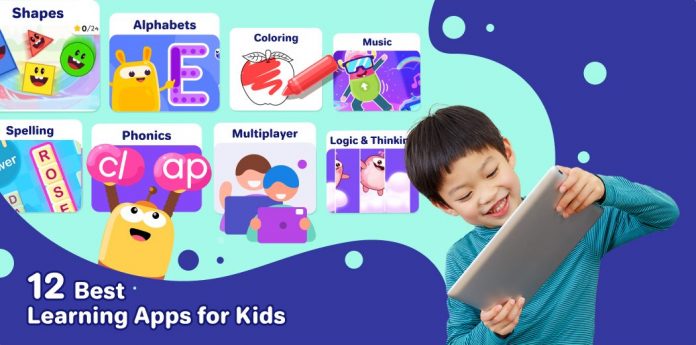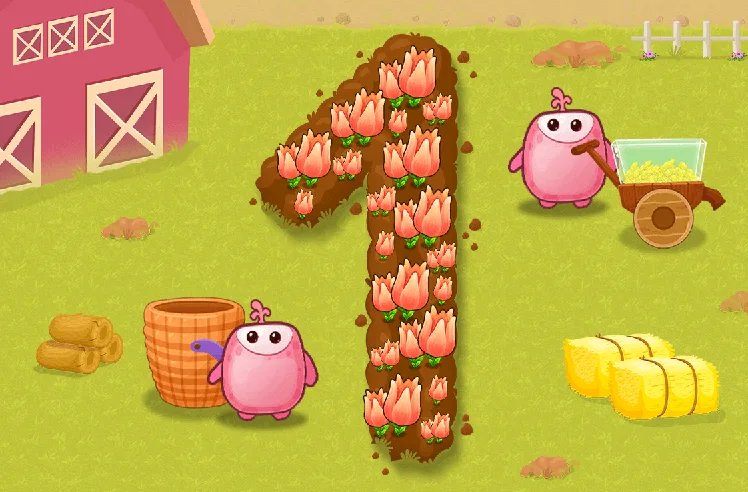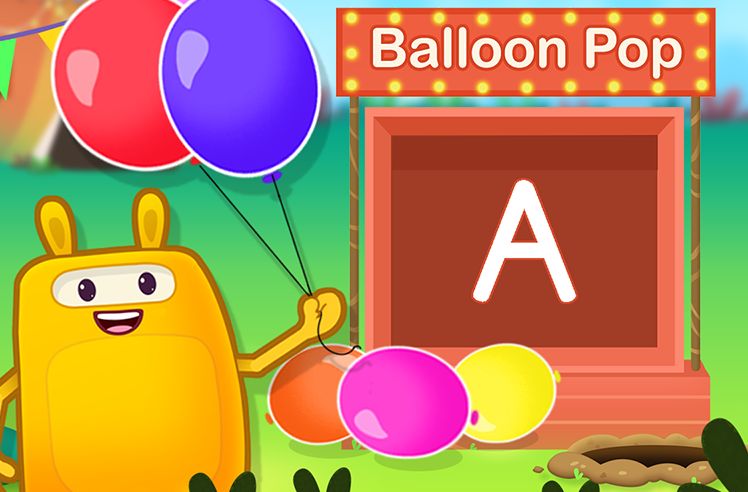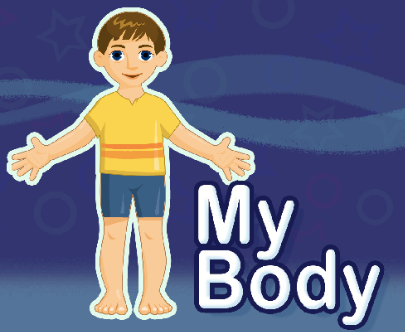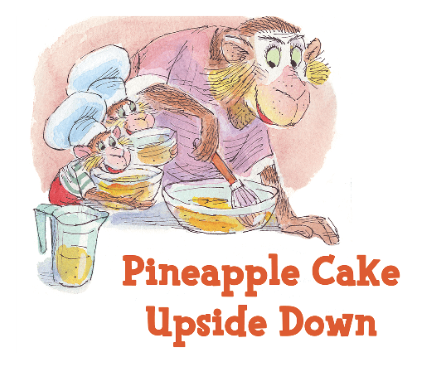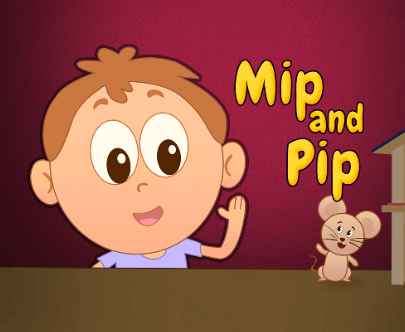Parents today are turning to learning apps as powerful tools to support their children’s learning. But do these apps really make a difference? Research suggests they do. A systematic review published in the British Journal of Educational Technology found that 92% of studies reported positive effects of math-focused educational apps on young children, especially during their first three years of schooling. Similarly, a study in Pediatrics highlights how interactive learning apps for kids not only engage children but also promote active learning, making lessons more effective than passive methods like videos.
Math & ELA | PreK To Grade 5
Kids see fun.
You see real learning outcomes.
Watch your kids fall in love with math & reading through our scientifically designed curriculum.
Parents, try for free Teachers, use for free
Educational apps for kids are more than just games—they are designed to build critical skills like reading, math, problem-solving, and creativity in an interactive way that keeps kids motivated. In this blog, we’ve carefully chosen the best kids learning apps based on reviews, ratings, and educational value to ensure you’re getting the best options for your child.
12 Best Learning Apps for Kids
1. SplashLearn (Math, Reading and Early Skills)
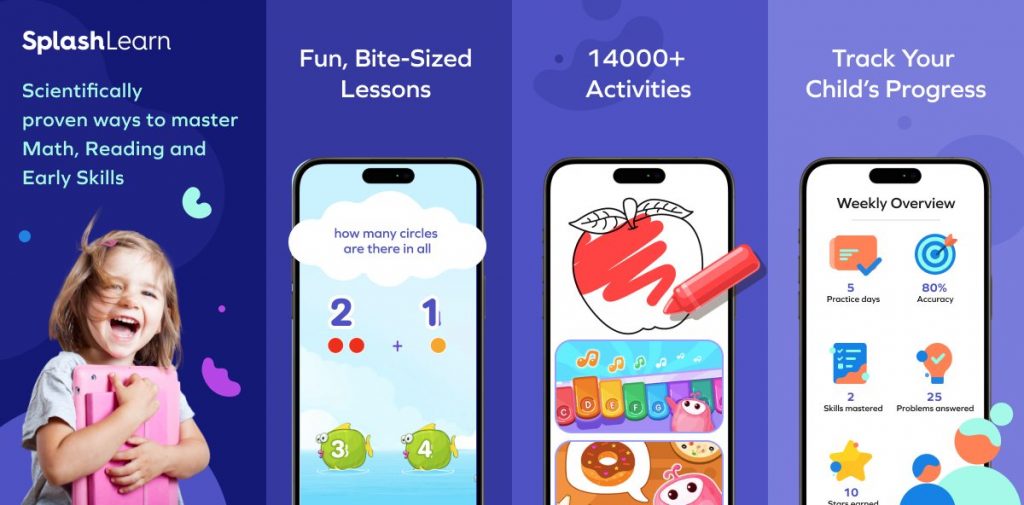
Age Range: 2-11 years
SplashLearn, with over 20 million downloads, is a research-backed online learning app designed to make learning math, reading, and early skills fun and effective for kids. Built on game-based learning principles, the app combines interactive experiences with proven teaching methods to ensure children grasp vital skills like reading, writing, math, problem-solving, critical thinking, creativity, and general knowledge.
Educational studies have shown that active, play-driven learning significantly boosts comprehension and retention in children. SplashLearn taps into this with a curriculum crafted by experts to align with educational standards, ensuring that kids enjoy the process and achieve measurable outcomes.
What are the different content types on SplashLearn?
- Games: Over 10,000 interactive math and reading games that dynamically adapt to your child’s progress.
Engage, Learn, and Play
Learn math, reading, and more while having loads of fun!
- Worksheets: Digital, printable worksheets designed for additional practice and reinforcement of key concepts.
Practice, Learn, and Excel!
Strengthen understanding with engaging and easy-to-follow worksheets
- Live Classes: Webinar-like live teacher-led sessions provide personalized guidance.
- Multiplayer Games: Collaborative learning experiences allow children to play and learn with peers, building social and cognitive skills.
Collaborate and Learn Together!
Team up and compete to sharpen your math and language skills
- Digital Library:
You can access books in multiple languages, including English, Spanish, Mandarin, and more. It offers various formats like chapter books, comics, and early readers. You can filter books by reading levels (Lexile, GRL, DRA) or choose from fiction, non-fiction, and popular themes. With features like “Read to Me,” highlighted text and editor recommendations, it’s easy to find engaging, level-appropriate content. The library also tracks each child’s reading progress, making it a valuable resource for inspiring a lifelong love of reading.
Key Features of SplashLearn:
- Adaptive Learning: Personalized games and activities adjust to each child’s skill level and learning pace.
- Reward System: Motivates children through badges, stars, and other rewards for completing activities and achieving milestones.
- Progress Tracking: Detailed reports to monitor learning milestones and achievements.
- Safe & Ad-Free Environment: Designed for children, ensuring a distraction-free and secure learning experience.
Price: Access to 2 free activities every day, a free 7-day trial post which parents can choose from its different pricing plans (starting $7.49/month when billed annually).
Download The App: iOS and Android
2. ABCMouse (Math, Reading, Science and Art)
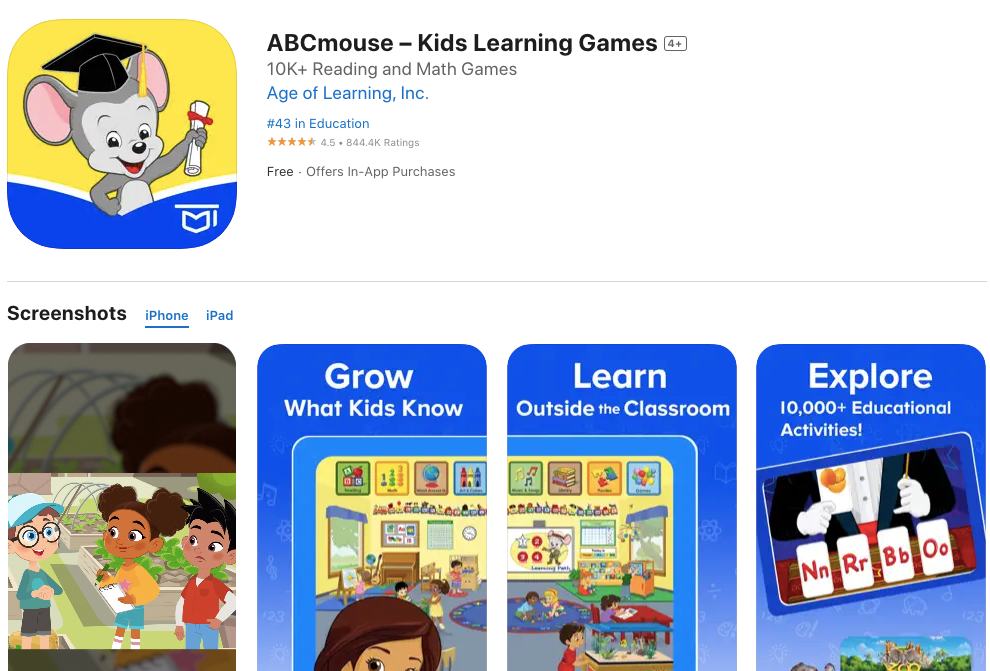
Age Range: 2-8 years
ABCmouse is a comprehensive early learning educational software for kids that covers a wide range of subjects, including reading, math, science, and art. It offers interactive lessons and activities that keep children engaged while they learn.
Key Features:
- Age-appropriate curriculum
- Over 9,000 activities and lessons
- Progress tracking for parents
- Fun animations and games
Price: Monthly plan starting at $12.99/month
Download The App: iOS and Android
Related Reading: Best Alphabet Learning Apps for Kids
3. Khan Academy Kids (Math, Reading, and Socio-Emotional Development)
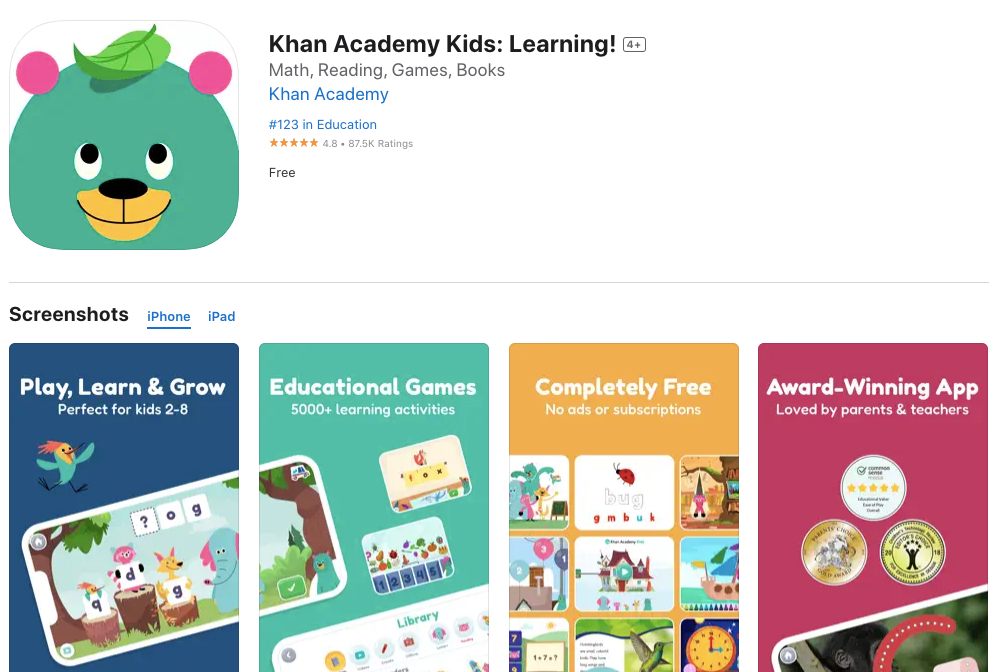
Age Range: 2-7 years
Khan Academy Kids is an educational app for kids that offers a diverse range of activities, from math and reading to socio-emotional development. It’s designed to encourage a love for learning in young children.
Key Features:
- Engaging characters and stories
- Adaptive learning pathways
- Offline access to content
- Progress tracking for parents
Price: Free
Download The App: iOS and Android
Related Reading: Best Reading Apps for Kids
4. Duolingo ABC (Reading and Writing)
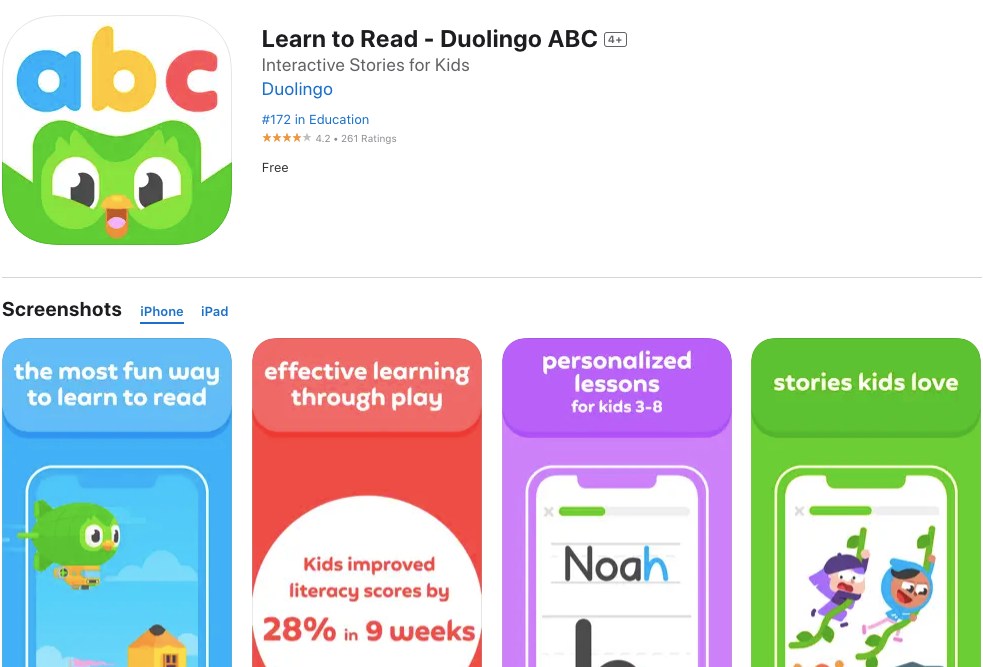
Age Range: 3-7 years
Duolingo ABC is one of the best kindergarten apps that focuses on teaching children the fundamentals of reading and writing in their native language. It uses gamified lessons and colorful visuals to make learning fun.
Key Features:
- Phonics-based learning
- Interactive stories and activities
- Progress tracking for parents
- No ads or in-app purchases
Price: Free
Download The App: iOS and Android
Related Reading: Best Writing Apps for Kids
5. ScratchJr (Coding and Computational Thinking)
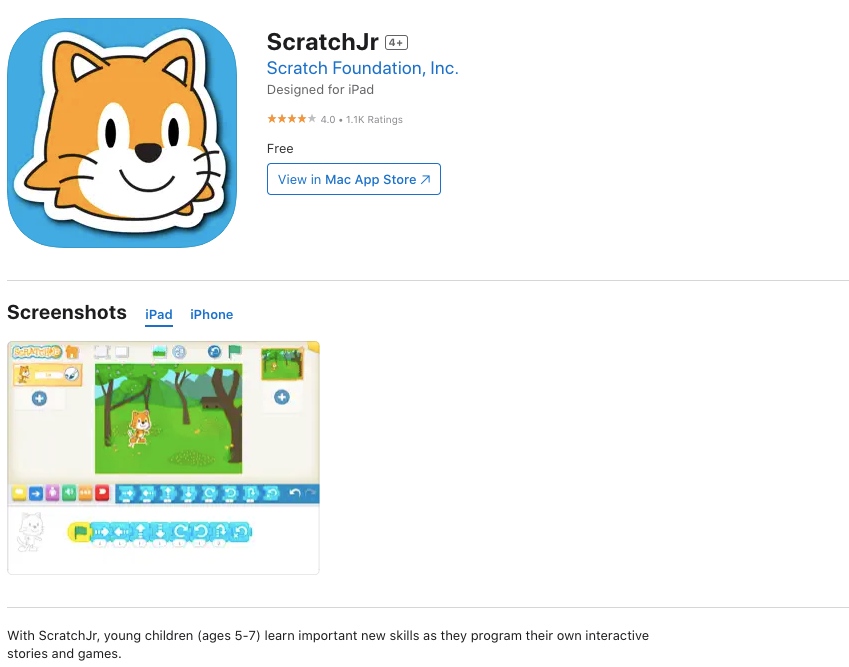
Age Range: 5-7 years
ScratchJr is a coding app for young children. It introduces them to the basics of programming through creative and interactive projects, fostering computational thinking and problem-solving skills.
Key Features:
- Drag-and-drop coding blocks
- Storytelling and animation projects
- Encourages creativity and logic
- No in-app purchases or ads
Price: Free
Download The App: iOS and Android
Related Reading: Best Problem Solving Activities for kids
6. Spell Stage (Spelling and Vocabulary)
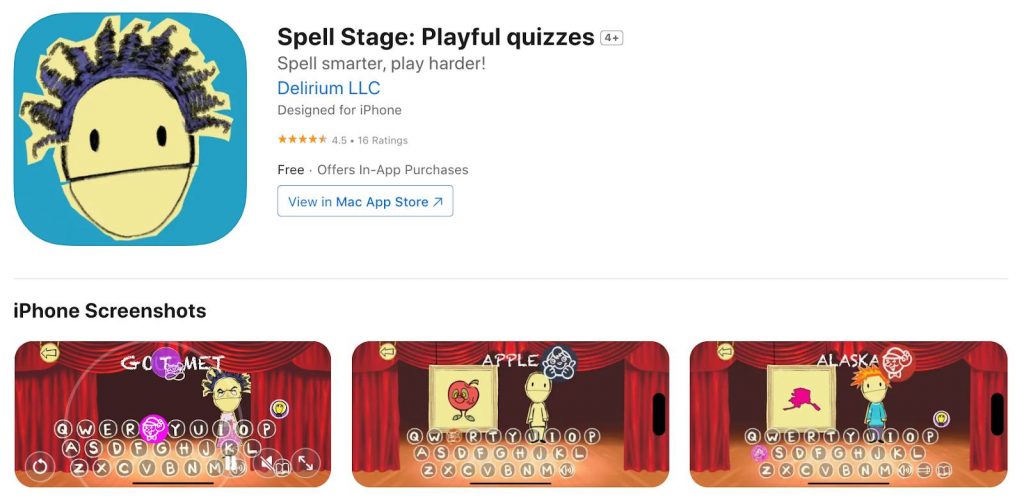
Age Range: 6-12 years
Spell Stage is a dynamic app designed to make spelling and vocabulary building fun and interactive. With over 30 themed spelling bees at varying difficulty levels, this app helps kids improve their language skills while keeping them engaged. Children can participate in quizzes ranging from basic word lists to specialized topics like U.S. states and capitals, ensuring a comprehensive learning experience.
Key Features:
- Over 30 themed spelling bees with increasing difficulty levels.
- Supports vocabulary development through targeted word quizzes.
- Custom quiz creation for focused practice.
Price: Free with in-app purchases for advanced features.
Download The App: iOS
Related Reading: Best Spelling Apps For Kids
7. Prodigy Math (Math)
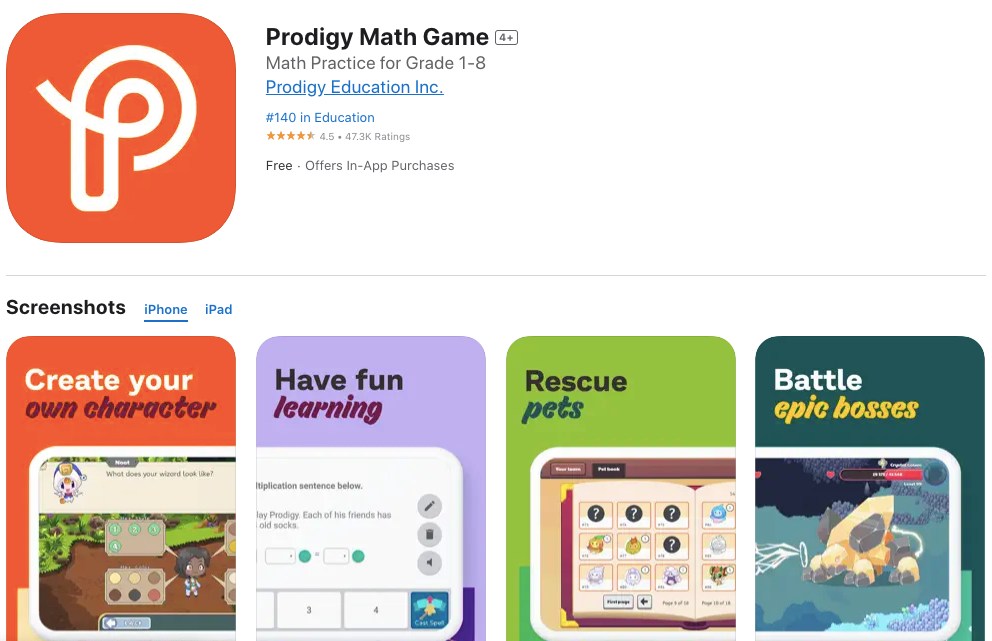
Age Range: 6-14 years
Prodigy is an engaging way for kids to practice math skills through a fantasy-themed role-playing game. It adapts to a child’s skill level and curriculum, making math fun.
Key Features:
- Curriculum-aligned math challenges
- Interactive battles and quests
- Real-time progress reports
- Motivating rewards and characters
Price: Starting at $8.33 /month
Download The App: iOS and Android
Related Reading: Best Math Apps for Kids
8. Epic! (Ebook)
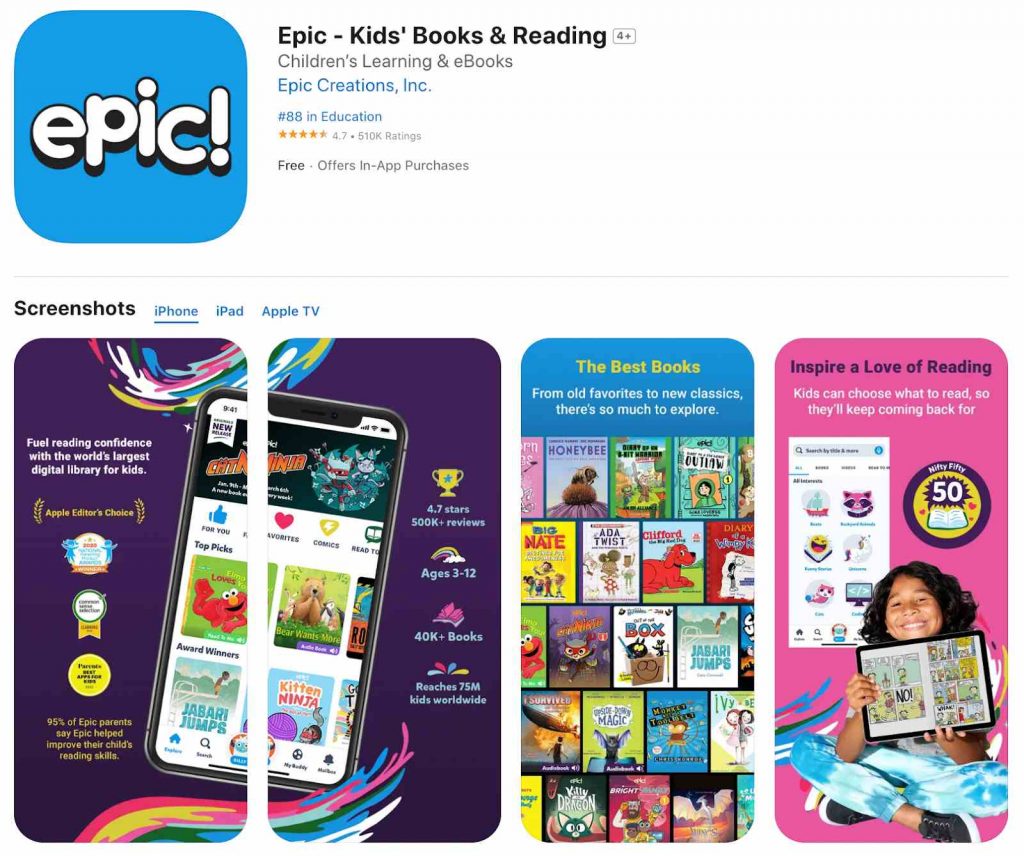
Age Range: 2-12 years
Epic! is a leading ebook app designed to foster a love for reading in children. With a library of over 40,000 books, audiobooks, and educational videos, Epic caters to all types of young readers, from early learners to advanced bookworms. The app includes Read-to-Me books and audiobooks, perfect for beginners and auditory learners, along with chapter books and non-fiction for older kids.
Key Features:
- Personalized recommendations to match interests and reading levels.
- Offline access for uninterrupted reading.
- Progress tracking for parents and educators.
- Supports multiple profiles, ideal for families or classrooms.
Price: Free trial available, with subscription plans starting at $9.99/month.
Download The App: iOS and Android
Related Reading: Best Audiobooks for Kindergarteners and Preschoolers
9. BrainPOP Jr. Movie of the Week (Science, Social Studies, Reading, and General Knowledge)
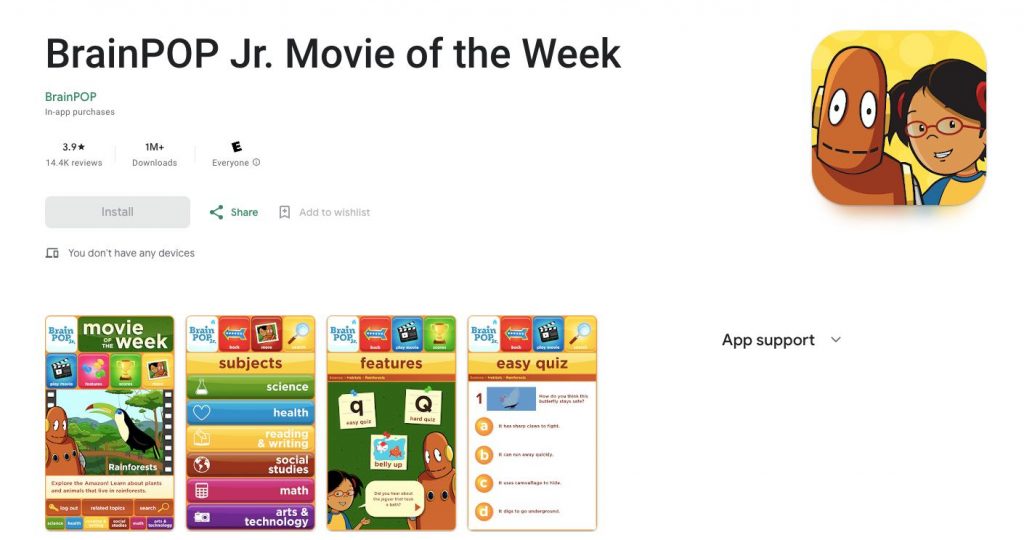
Age Range: 3-7 years
BrainPOP Jr. Movie of the Week provides educational videos on a wide range of topics, helping kids understand complex concepts through short, animated movies.
Key Features:
- Age-appropriate videos
- Quizzes and activities for comprehension
- Variety of subjects covered
- Engaging and informative content
Price: Subscription-based, with a free video each week
Download The App: Android
Related Reading: Best Educational YouTube Video Channels for Kids
10. Writing Wizard (Handwriting)
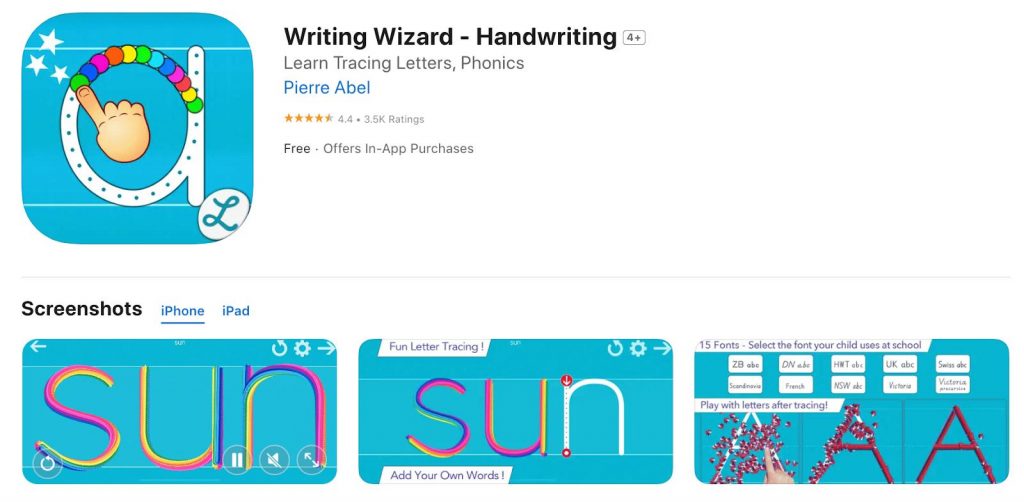
Age Range: 3-8 years
Writing Wizard is a highly interactive app designed to help kids develop handwriting skills. The app uses engaging visuals, animations, and tracing activities to make learning how to write letters and words fun and effective.
The app supports multiple languages and includes features that reinforce letter recognition, phonics, and spelling, ensuring a comprehensive approach to early literacy.
Key Features:
- Tracing activities for letters, words, and shapes.
- Fun animations and sounds to make handwriting practice enjoyable.
- Support for multiple languages and customizable fonts (including cursive).
- Printable worksheets for offline practice.
- Detailed progress reports for parents and educators.
Price: Free with in-app purchases for additional content.
Download The App: iOS and Android
11. MarcoPolo Learning (Math, Science, Social Studies, and Early Learning)
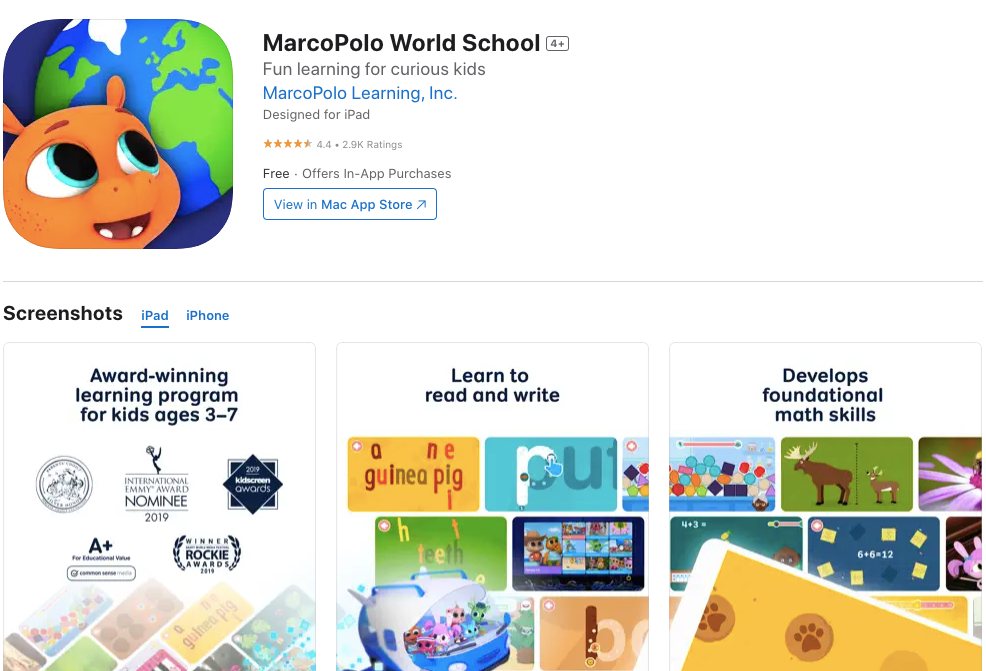
Age Range: 3-7 years
MarcoPolo Learning is one of the top learning apps for students, offering a comprehensive curriculum for early learning. It covers a wide range of subjects, including math, science, and social studies, through interactive lessons and activities.
Key Features:
- Age-appropriate curriculum
- Engaging lessons and activities
- Progress tracking for parents
- Personalized learning paths
Price: $9.99 per month
Download The App: iOS and Android
12. Todo Math (Math)
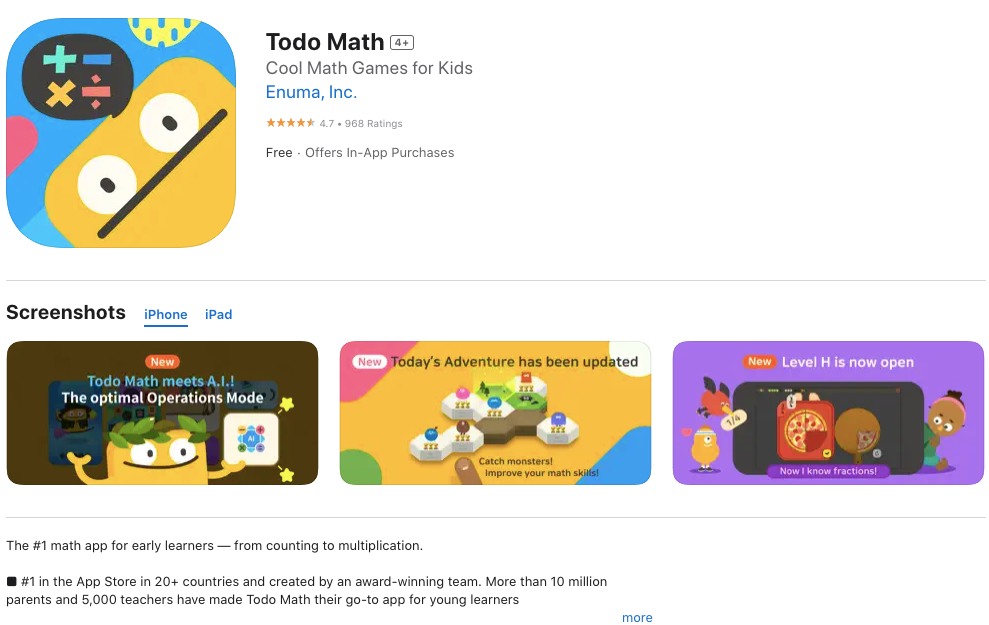
Age Range: 3-8 years
Todo Math is an app that focuses on developing math skills in young children. It offers a wide range of math activities and games that adapt to each child’s abilities.
Key Features:
- Math curriculum aligned with standards
- Adaptive learning pathways
- Fun math games
- Progress tracking for parents
Price: $69.99/year
Download The App: iOS and Android
In this section, we’ve explored some of the best educational apps for kids, offering a wide array of enriching experiences for learning and growth. From phonics and math to imaginative play and science exploration, these apps for kids’ learning cater to diverse interests and age groups, ensuring that young learners can embark on an engaging educational journey tailored to their needs.
Related Reading: Best Educational iPad Apps For Kids
7 Tips To Choose An Educational App for Your Kid
Choosing the right educational apps for your kids can be a bit like finding the perfect puzzle piece—it should fit just right. Here are some simple tips to help you pick the best ones:
1. Age-appropriateness: Look for kid-friendly apps that match your child’s age and developmental stage. Apps usually have age recommendations. Choose the ones that align with your child’s age to ensure the content is suitable.
2. Interactive and engaging: Kids learn best when they’re having fun. Pick apps with interactive games and activities. Look for those that encourage problem-solving, creativity, and critical thinking.
3. Safety first: Safety is non-negotiable. Ensure the app is safe for kids to use. It should have no ads or pop-ups leading to external or adult sites. Look for apps with parental controls and privacy settings.
4. Reviews and recommendations: Don’t just take the app’s word for it. Read reviews from other parents or caregivers. They can give you insights into how well the app works and its educational value.
5. Try before you buy: Many apps offer free trials. Take advantage of these to see if the app suits your child’s learning style and preferences before committing to a purchase.
6. Your child’s feedback: Involve your child in the decision-making process. Ask them what they enjoy and find interesting. Their input can help you choose apps that resonate with them.
7. Trial and error: Don’t be afraid to try out a few different apps. Every child is unique, and what works for one may not work for another. Be open to exploring various options.
Remember, it’s not about finding the “perfect” app; it’s about finding the one that works best for your child’s learning journey. These simple tips can help you make informed choices and ensure that the educational apps you select are both fun and educational.
Related Reading: Best Educational Websites for Kids that Spark Curiosity
Frequently Asked Questions (FAQs)
Which is one of the best educational game apps to use for free?
Splashlearn is one of the best free educational apps for kids to play games. You can access to free activities every day.
Are online learning apps safe for kids?
Yes, reputable learning apps for students prioritize safety by offering age-appropriate content and features, as well as parental controls to monitor usage.
Can kids use these apps independently?
Yes, the apps chosen in this blog prioritize child safety and offer age-appropriate content. However, it’s a good practice for parents and caregivers to supervise young children while they use these apps and review privacy settings.
Can these kid’s apps replace traditional learning methods?
Children’s learning apps can complement traditional methods but should not replace them entirely. They provide engaging opportunities for skill development but should be part of a balanced learning approach.

















